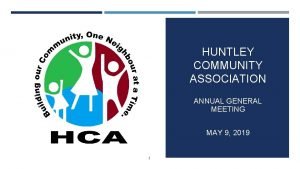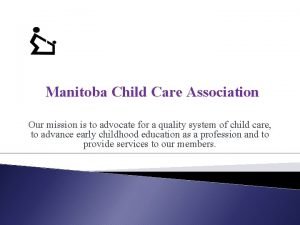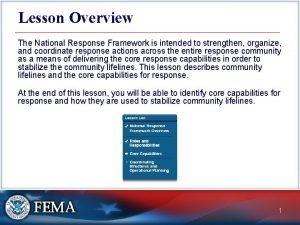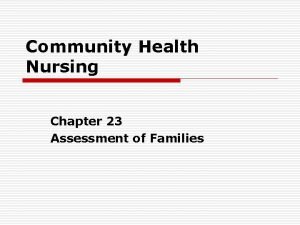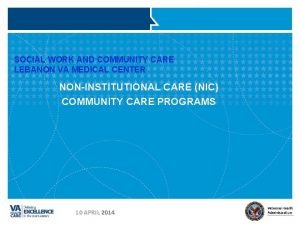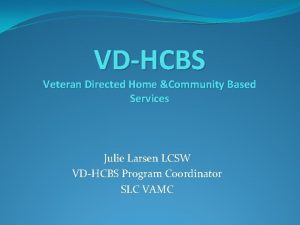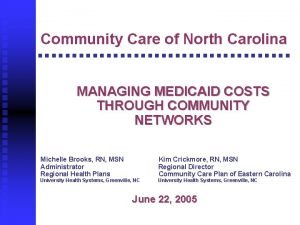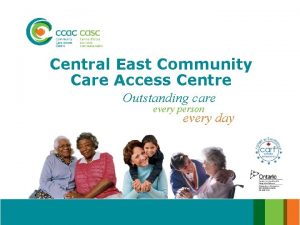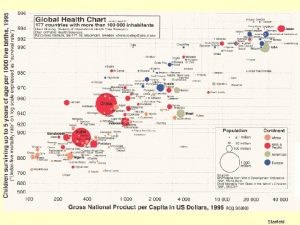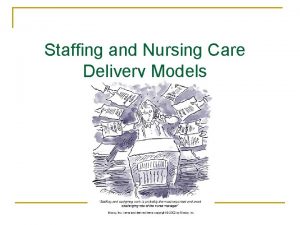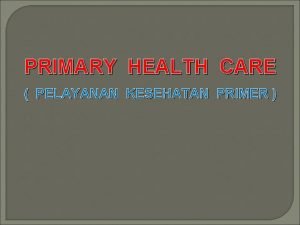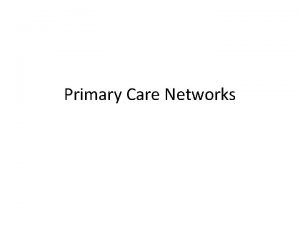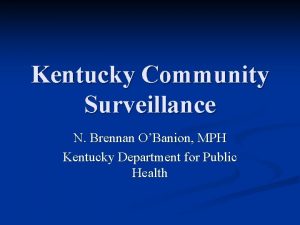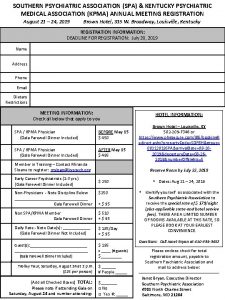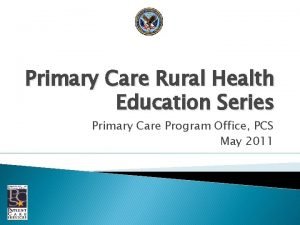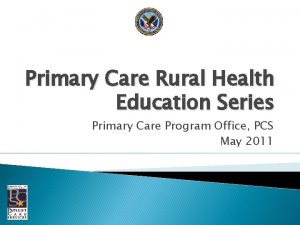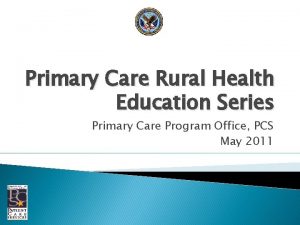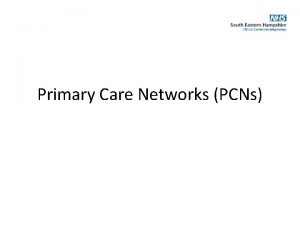Kentucky Primary Care Association April 7 2016 Community



































- Slides: 35

Kentucky Primary Care Association April 7, 2016 “Community Health Workers Impacting the Healthcare Workforce” Presented by: Frances J. Feltner, RN, MSN, DNP Director University of Kentucky Center of Excellence in Rural Health


Objectives: Define and describe: • Definition of a CHW • The CHW job description • Kentucky Homeplace Scope of Work • CHW training process • CHWs working with health teams can improve patient access and health outcomes

Definition: Community Health Workers • A Community Health Worker, (CHW) is a frontline public health worker who is a trusted member of and/or has an unusually close understanding of the community served. • This trusting relationship enables the CHW to serve as a liaison/link/intermediary between health/social services and the community to facilitate access to services and improve the quality and cultural competence of service delivery. • A CHW also builds individual and community capacity by increasing health knowledge and self-sufficiency through a range of activities such as outreach, community education, informal counseling, social support, and advocacy. 1[p. 1] http: //www. apha. org/advocacy/policysearch/default. htm? id=1393

Definition: Community Health Workers CHWs do NOT provide clinical care and generally do NOT hold another professional license; their expertise is based on shared life experience (and often culture) with the people they serve.

Definition: Navigators • Patient navigation in cancer care refers to the assistance offered to healthcare consumers (patients, survivors, families, and caregivers) to help them access and then chart a course through the healthcare system and overcome any barriers to quality care. • A patient navigator can be a registered nurse or a social worker who functions as a “guide. ” • Navigators help their patients move through the complexities of the healthcare system—getting them more timely treatment, more information about treatment options and preventive behaviors. 2[p. 1] http: //www. apha. org/advocacy/policysearch/default. htm? id=1393

Kentucky Homeplace CHW Job Description • Community health workers are culturally competent and effective community leaders. They serve the counties with the highest rates of health disparities and are trained to act as liaisons for the uninsured, underinsured and underserved population in their communities. • Community health workers work with their communities to bridge the gaps of accessing health care and social services. They empower individuals and their communities to live a healthier quality of life.

Kentucky Homeplace CHW Job Description: Duties and Responsibilities • Successfully complete a training program and practicum in home visiting services. • Conduct home visits; perform assessments to identify client and family needs related to mental health, health and social services; provide information and education about services; and connect and coordinate access to the appropriate providers for clients and their families. • Community engagement: Act as a liaison between clients and their families, mental health and human service providers, and join and attend community coalitions and/or networks to report barriers and share solutions for specific characteristics of conditions which impede clients from obtaining available services. • Work with multi-disciplinary teams to establish action plans for clients and families; provide health coaching to assure action plans are carried out; link clients with all needed services; connect clients to support groups and educational opportunities; and provide emotional and educational support for clients and their families. CHWs encourage disease self-management of chronic diseases. • Maintain precise records in accordance with protocol defined in the Community Health Workers scope of work and core competencies. • Participate in continuing education programs, in-service education programs, and peer support system with other CHWs. • CHWs support community-based research. CHW’s duties include identifying and enrolling often hard to reach study subjects according to IRB provisions, collecting background and measurement data using computer database programs, and providing overall research support.

Kentucky Homeplace CHW Job Description: Skill and Knowledge required: • This position requires the ability to disseminate information, ability to follow through and carry out plans of action, and good verbal skills. Priority will be given to those applicants who have been consumers of the social, housing, environmental, health and/or mental health systems. • Qualification for this position: High School Diploma or equivalent Valid Drivers License

CHW Job Classification • The United States Department of Labor, Bureau of Labor Statistics now recognizes and has classified the Community Health Worker title in category 21 -1094. • The job duties are described as: community health workers assist individuals and communities to adopt healthy behaviors. Conduct outreach for medical personnel or health organizations to implement programs in the community that promote, maintain, and improve individual and community health. May provide information on available resources, provide social support and informal counseling, advocate for individuals and community health needs, and provide services such as first aid and blood pressure screening. May collect data to help identify community health needs. Excludes "Health Educators" (21 -1091). http: //www. bls. gov/soc/2010/soc 211094. htm

Community Health Workers Expanding the Scope of the Health Care Delivery System • “The changing landscape of the U. S. population, which is growing older and more diverse, coupled with other challenges—the increasing complexity of the health care system, rising health care costs, growing numbers of uninsured, more people with chronic diseases, and provider shortages— have policymakers looking for ways to extend the already strained health care system and more effectively reach underserved communities”. • “In response, states are examining how community health workers (CHWs) can connect underserved populations with health and human service providers. Although the CHW concept is not new, states and other health care providers are partnering more often with these workers to help individuals navigate a complex health care system, receive primary and preventive care, maintain healthy behaviors, and manage chronic conditions in culturally and linguistically relevant ways”. BY Kristine Goodwin and Laura Tobler April 2008

CHW Roles A 2011 publication from HRSA’s Office of Rural Health Policy states that CHW activities are tailored to meet the unique needs of their communities. • Create more effective linkages between vulnerable populations and the health care system • Manage care and care transitions for vulnerable populations • Ensure cultural competence among health care professionals serving vulnerable populations • Provide culturally appropriate health education on topics related to chronic disease prevention, physical activity and nutrition • Advocate for underserved individuals to receive appropriate services • Provide informal counseling • Build community capacity to address health issues • CHWs play an important role in community-based research, serving as a bridge between outside researchers and community members.

Kentucky Homeplace CHW Core Competencies • Communication • Use of Public Health Concepts and Approaches • Organizational and Community Outreach • Advocacy and Community Capacity Building • Care Coordination and System Navigation • Health Coaching • Documentation, Reporting and Outcome Management • Legal, Ethical and Professional Conduct

Kentucky Homeplace CHW Scope of Practice • Advocate for individual and community needs • Navigate health and human services systems • Bridge gaps through networking with communities and health/social service systems to remove barriers • Care coordination • Provide health education, preventive health promotion, health coaching and reinforcement • Build individual and community capacity • Competency-based training and credentialing program • Developing a stable source of funding

Overview of Kentucky Homeplace Training • The protocol manual builds upon over 20 years of developing, implementing, and training Community Health Workers (CHWs). • The training includes 40‑hour didactic training and 80‑hour practicum (shadowing experienced CHWs) within the three month orientation period. • The training covers the major health and social problems encountered by Kentuckians. • The manual was developed in consultation with health providers, experience of CHWs and from researching current health information. • Components of every client’s care include emphasis on prevention, chronic disease self-management and encouragement of a healthy lifestyle.

Community Health Worker Additional Trainings • All Community Health Workers must have and maintain certification as Lay Leaders for Chronic Disease Self Management and Diabetes Self Management Programs through Stanford University. • All Community Health Workers must have at least 8 hours training in Mental Health First Aid. • All Community Health Workers should be trained in the Asthma Healthy Home Program. • All Community Health Workers should be trained in CDC Diabetes Prevention Program as “lifestyle coaches”. These programs will be in addition to the basic training and should be obtained within the first year of practice as a CHW. http: //www. cdc. gov/DHDSP/pubs/chw_elearning/index. html

National Diabetes Prevention Program

Community Health Worker Optional Additional Trainings Course Overview • The sessions for this course include: • Introduction to Community Health Workers (CHWs) • Current Issues for the CHW Workforce • Workforce Development • Occupational Regulation; Standards for Research and Evaluation • Sustainable Funding for CHW Positions • Moving Policy and Systems Change Forward Source: CDC http: //www. cdc. gov/DHDSP/pubs/chw_elearning/ind ex. html

Community Health Worker Required Trainings • CHW certificate training; online trainings; database training; Cardiopulmonary Resuscitation (CPR) certification; and training with peer employees. • CHW certification training: training will consist of CHW training with the overall view of the program, job duties and policies and procedures. In addition, training with the medical educator regarding chronic diseases and medical education components. • Kentucky Homeplace CHW training includes 40 hours in class training to prepare CHW to work as “generalist” in their communities.

Overview of the training and how to participate • Online pre-training includes institution required trainings such as Health Insurance Portability and Accountability ACT (HIPAA), Research Human Protection, Compliance, etc… • The protocol manual builds on the 40‑hour didactic training and 80‑hour practicum (shadowing experienced CHWs) within the three month orientation period. The training covers the major health and social problems encountered by Kentuckians. The manual was developed in consultation with health providers and from researching current health information. Components of every client’s care include emphasis on prevention, chronic disease self-management and encouragement of healthy lifestyle. • Kentucky Homeplace CHW training includes 40 hours in class training to prepare CHW to work as “generalist” in their communities.

Overview of the training and how to participate http: //ruralhealth. med. uky. edu/training-1

Kentucky Homeplace Mission The mission of Kentucky Homeplace is to provide access to medical, social, and environmental services for the citizens of the Commonwealth. Vision/Goals Statement To educate Kentuckians to identify risk factors and use preventative measures to become a healthier people with knowledge and skills to access the healthcare and social system.

Partnerships with primary care providers Patients CHWs Providers CHWs Patients

CHWs can be part of a care team Case Management/Care Coordination Stages; Making a Plan for Clients • Complete an Initial Assessment • Identify Goals • Develop Team Care Plan • Implement Plan • Monitor outcomes • Advocate • Celebrate reached goals and improved outcomes

Kentucky Homeplace CHW Roles and Responsibilities: • Outreach and community mobilization • Assist case management teams in care coordination • Home-based support • Health promotion and health coaching • System navigation • Participatory research • Community/cultural liaison

CHWs positively contribute towards achievement of the Triple Aim of Healthcare Improve Patient Experience CHWs are effective connectors to the resources in their communities; they are trusted members of their communities because they have an unusually close understanding of the social context of patient’s lives. Improve Population Health CHWs are an integral member of primary care team. They contribute to chronic disease management through ensuring continuity of care, coordination of care and overall quality of care. CHWs educate and coach patients CHWs understand risk behaviors and are very successful in increasing serve as motivators and provide the use of preventive health services. community engaged risk Working with the team CHWs management education and support. encourage patients in self-care management and care coordination. The goal is to strengthen patient’s They also collect accurate patient self-efficacy, improve medication data and contribute to community adherence, and improve access and based research in reaching the quality of care. underserved, hard to reach valuable populations within their communities. Reducing Costs Coaching patients on preventive health behavior Reducing ER visits Reducing hospital admissions and readmissions Navigate and connect patients to community based primary care services Enhancing health provider’s understanding of patient needs Follow-up and appropriate referrals

National Support and CHW Recognition • Patient Protection and Affordable Care Act of 2010 • CDC Division for Heart Disease and Stroke Prevention 2011 • National Prevention Council 2011 • HHS Action Plan to Reduce Racial and Ethnic Health Disparities 2011 • HHS National Health Action Plan to Improve Health Literacy 2010 • Agency for Healthcare Research & Quality 2009 • American Public Health Association 2009, 2001 • Institute of Medicine 2003 • American Medical Association 2002

Medicaid Will Allow Reimbursement for Community Health Worker Preventive Services! • The Centers for Medicare and Medicaid Services (CMS) created a new rule which allows state Medicaid agencies to reimburse for preventive services provided by professionals that may fall outside of a state’s clinical licensure system, as long as the services have been initially recommended by a physician or other licensed practitioner. The new rule for the first time offers state Medicaid agencies the option to reimburse for more community-based preventive services, including those of CHWs. The rule goes into effect on January 1, 2014. • The new rule now states, • “(c) Preventive services means services recommended by a physician or other licensed practitioner of the healing arts acting within the scope of authorized practice under State law to— 1. 2. 3. Prevent disease, disability, and other health conditions or their progression; Prolong life; and Promote physical and mental health and efficiency. ”

Opportunities Examples of services by non-licensed providers that could potentially be reimbursable by Medicaid: • Care coordination and educational counseling • Home visiting • Group health education (Health Coaching) • Community health worker services, such as asthma education to Medicaid enrollees • YMCA diabetes prevention program

Conclusion • Community health workers (CHWs) play a significant role in reducing and/or managing chronic illnesses, reducing healthcare costs, and improving the overall health of the population • Evidence gathered over the years makes it clear that support for, and development of, a CHW workforce is a wise investment • At the federal level, CHWs are recognized as professional members of the health care workforce who effectively address social determinants of health and reduce health disparities (US Department of Health and Human Services) • They are also specifically listed as important professionals on the health care team in the Affordable Care Act of 2010

Visit us online www. kyruralhealth. org

Questions and Discussions

Publications 2013 • Ely; White; Jones; Feltner; Gomez; Shelton; Slone; Van Meter; De. Simone; Schoenberg; and Dignan. Cervical Cancer Screening: Exploring Appalachian Patients’ Barriers to Follow Up Care. WSHC: Social Work in Health Care. • Feltner, Fran; Dignan, Mark. Effectiveness of an Intervention for Adherence to Follow-up Recommendations for Abnormal Pap Tests in Appalachian Kentucky. Health Behavior and Policy Review. 2012 • Feltner, Fran; Donaldson, Elisabeth; Holtgrave, David; Duffin, Renea; Funderburk, William; and Freeman, Harold. Patient Navigation for Breast and Colorectal Cancer in Three Community Hospital Settings: An Economic Evaluation. Journal of Cancer. • Feltner, Frances; Dignan, Mark; Whitler, Elmer; Gross, David and Ely, Gretchen. Effectiveness of Community Health Workers in Providing Outreach and Education for Colorectal Screening in Appalachian Kentucky. Social Work in Health Care, May 2012 2011 • Feltner, Fran; Wilson, Emery; Whitler, Elmer and Asher, Linda. UK College of Medicine – Future Role of Community Health Workers for Reducing Health Disparities. Poster presented at the 2011 NRHA Annual Rural Health Conference in Austin, Texas.

References Appalachian Regional Commission, April 2011; Accessed April 11, 2012. Available at www. arc. gov Centers for Disease Control and Prevention (CDC). Behavioral Risk Factor Surveillance System Survey Data. Atlanta, Georgia: U. S. Department of Health and Human Services, Centers for Disease Control and Prevention, [2010]. Centers for Disease Control and Prevention, (CDC). (2011). National Diabetes Fact Sheet, 2011: Facts on Diabetes, Atlanta, GA: Author, http: //www. cdc. gov/diabetes/pubs/pdf/ndfs_2011. pdf Centers for Disease Control and Prevention, (CDC). (2011). Promoting Policy and Systems Change to Expand Employment of Community Health Workers (CHWs), http: //www. cdc. gov/dhdsp/pubs/chw_elearning. htm Goodwin K, Tobler L. Community health workers: expanding the scope of the health care delivery system. National Conference of State Legislatures. 2008, April; Available at http: //www. ncsl. org/print/health/CHWBrief. pdf. , Accessed February 10, 2011. Kentucky Diabetic Network (2008), Kentucky diabetes fact sheet. Retrieved on October 1, 2010 from, http: //www. kentuckydiabetes. net/ Lawrence E. Barker, Ph. D, Karen A. Kirtland, Ph. D, Edward W. Gregg, Ph. D, Linda S. Geiss, MA, and Theodore J. Thompson, MS. Geographic distribution of diagnosed diabetes in the United States: a diabetes b. American Journal of Preventive Medicine 2011; 40(4).

References (continued) U. S. Department of Health & Human Services, Health Resources and Services Administration, Bureau of Health Professions. Community health worker national workforce study. March 2007; Accessed February 10, 2011. Available at http: //bhpr. hrsa. gov/healthworkforce/chw/ Centers for Disease Control and Prevention. National diabetes fact sheet: national estimates and general information on diabetes and pre-diabetes in the United States, 2011. Atlanta, GA: U. S. Department of Health and Human Services, Centers for Disease Control and Prevention, 2011. Online at: http: //www. cdc. gov/diabetes/pubs/pdf/ndfs_2011. pdf Retrieved [03/30/2012 ]. Centers for Disease Control and Prevention: National Diabetes Surveillance System. Available online at: http: //apps. nccd. cdc. gov/DDTSTRS/default. aspx. Retrieved [03/30/2012].
 United states bureau of labor statistics
United states bureau of labor statistics Primary secondary tertiary care
Primary secondary tertiary care Dc primary care association
Dc primary care association Missouri primary care association
Missouri primary care association Uhc medication prior authorization form
Uhc medication prior authorization form Community oriented primary care definition
Community oriented primary care definition Kygca
Kygca Kentucky municipal utilities association
Kentucky municipal utilities association Mmmmmmmmmmmmmmmmmmmmm
Mmmmmmmmmmmmmmmmmmmmm Linton granta fc
Linton granta fc International association for community development
International association for community development Huntley community association
Huntley community association Canadian association for community living
Canadian association for community living Ciip canada
Ciip canada Auckland primary principals association
Auckland primary principals association Manitoba child care association
Manitoba child care association Plan together in community mobilization
Plan together in community mobilization Stabilizing community lifelines is the primary effort
Stabilizing community lifelines is the primary effort Kingsley community primary school
Kingsley community primary school Bradshaw community primary school
Bradshaw community primary school Magenta cyan and yellow are the ____ color. *
Magenta cyan and yellow are the ____ color. * Papu mental health
Papu mental health Veterans directed home and community based care
Veterans directed home and community based care Family care plan in community health nursing
Family care plan in community health nursing Community medical care lebanon va
Community medical care lebanon va Veterans directed home and community based care
Veterans directed home and community based care Community care plan of eastern carolina
Community care plan of eastern carolina Central east community care access centre
Central east community care access centre Trafford primary care trust
Trafford primary care trust Lane center uccs
Lane center uccs Australian primary health care research institute
Australian primary health care research institute Starfield primary care
Starfield primary care Modular nursing model
Modular nursing model Primary care adalah
Primary care adalah Principles of primary health care
Principles of primary health care Principles of phc
Principles of phc











